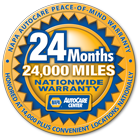
AUTONET TV
Archive for September 2022If You Drive Like a Maniac (Aggressive Driving is Bad for a Vehicle)Posted September 25, 2022 9:54 AMWhen someone mentions driving like a maniac, they're not talking about you, surely? Besides the safety issues of aggressive driving, you should know that your vehicle will last a lot longer if you'll just mellow out a little. Here are four traits good drivers follow if they want their vehicles to go the extra distance. Cool—The driver who can't wait to get to the next stoplight is just shortening the life of his or her vehicle. Jackrabbit starts and uneven acceleration hurts your engine because the valves and cylinder heads are stressed more. All of those moving parts will wear out faster as well as other components that are connected. That means things like the air conditioner, power steering pump… just about anything that attaches by a belt or a pulley. Oh, and you'll be generating more heat. Heat is one of a vehicle's worst enemies. Warm—If you get in your cold vehicle which has been sitting overnight, start it up and rev the engine high, you've just put a lot of stress on your engine. That's because you didn't let the oil (that's been sitting down in the oil pan at the bottom of the engine) get to the moving parts in order to lubricate them. Some manufacturers advise that you run your vehicle for about 30 seconds before you take off. And if it's really cold out, you may be wise to let the engine run for a minute or two before putting a load on the engine. Also, for the first 5-15 minutes, keep your RPMs on the low side and don't jam on the accelerator. Smooth—You're trying to get somewhere in a hurry and have to jam on the brakes while traveling pretty fast. Just that one time can do more damage to the brakes than you would think. Lots of hard braking can overheat your brakes and damage your rotors, wearing them out way faster than someone who drives with a smoother touch. Hard braking also strains suspension parts, tires and engine mounts. Smart—You know what PRNDL stand for. Those are the letters in your automatic transmission (Park, Reverse, Neutral, Drive, Low). Here are another couple of letters: IQ. A smart shifter never goes into R to D without completely stopping the vehicle, unless, of course, you're anxious to spend some big dollars on your automatic transmission. These days, it's common to get 200,000 miles/320,000 kilometers out of a vehicle, no problem. It just takes regular maintenance (oil changes and regular service) and one other thing. Showing off: showing off a little moderation in driving habits with a big payoff in the end.
Automotive Tips from Madison Automotive: When to Replace a Damaged TirePosted September 18, 2022 9:06 AMRepair or Replace? That’s a question Memphis drivers ask when they have tire damage. Some punctures cannot be repaired because of their size or location. Punctures larger than a quarter of an inch (6.4 mm) are considered too large to be safely repaired. Punctures in the sidewall or near the shoulders may not be able to be repaired. And sometimes there is internal damage revealed on inspection that indicates the tire should not be repaired. Run flat tires should not be repaired. Repairing high performance tires may make them unsuitable for motorsports. Your friendly and professional Madison Automotive service advisor can inspect your damaged tire and tell you if it can be safely repaired or if it should be replaced - and then help you get back on the roads around Memphis. Coolant/Antifreeze Service at Madison AutomotivePosted September 11, 2022 8:57 AMAnyone who drives a car in Memphis knows that engines get hot when they run. But did you know that engines need to be cooled to keep running? Heat inside an engine can cause the metal parts to expand, which can seize up an engine and make it stop running. It can even ruin the entire engine! Good vehicle care requires keeping its cooling system in good condition.
Not Too Hot and Not Too Cold (Temperature Gauge)Posted September 4, 2022 10:17 AMYou know your body temperature is supposed to be 98.6 degrees F, 37 degrees C. Your vehicle has a normal temperature, too, and if you pay attention to it, that can save you some big headaches down the road. Many vehicles have a temperature gauge on the dash that takes the temperature of the engine's coolant. Some have a thermometer symbol, some read C-H (cold to hot). Many will have a red zone that shows when water temperature is getting into the danger zone. Others are digital and have a red warning light that signals overheating. And some vehicles have a light that goes on when the engine temperature is out of the normal range. If your vehicle has a gauge, pay attention to it. If you need help locating it, ask one of our Madison Automotive experts to give you a quick explanation. Chances are when the vehicle has been running for 15 minutes or more, the temperature gauge will settle into its own "normal" zone, often just below the midway point. If you have a digital readout, remember what that "normal" temperature is. Here's why. At any point when you're driving, the temperature gauge is the quickest way to get a sense that the engine is running the way it should, a quick health checkup, as it were. Say you're on a 3-hour trip, glance at that gauge every hour or so. It should always be in the same spot. If it starts to move one way or the other, you may be able to catch a problem before it gets serious. Pay special attention to it moving into the hot zone. The needle on the gauge is the easiest and least distracting way to see an engine heating up, but on a digital gauge, start paying attention if the temperature reaches 240ºF/115ºC or more. Remember, though, that just because the gauge reads "hot" doesn't mean your engine is on the verge of burning up. It could be a bad sensor and the engine will be at a normal temperature. But it also could be a failing water pump, coolant leak or thermostat. By pulling off the road and observing your engine, it will give you a pretty good idea if it's running hot or not. If the gauge is too "cold," it could be a broken gauge or thermostat sticking open. Usually being in the cold range isn't as worrisome, but you should have it checked out since other systems may be affected. Heat is one of a vehicle's worst enemies, especially when it comes from within. Know your vehicle's normal temperature and keep an eye on it.
| ||
SearchArchiveAugust 2020 (16)September 2020 (4) October 2020 (4) November 2020 (5) December 2020 (4) January 2021 (6) February 2021 (4) March 2021 (4) April 2021 (4) May 2021 (5) June 2021 (4) July 2021 (4) August 2021 (5) September 2021 (4) October 2021 (5) November 2021 (4) December 2021 (4) January 2022 (6) February 2022 (4) March 2022 (4) April 2022 (4) May 2022 (5) June 2022 (4) July 2022 (5) August 2022 (4) September 2022 (4) October 2022 (5) November 2022 (4) December 2022 (4) January 2023 (5) February 2023 (4) March 2023 (4) April 2023 (5) May 2023 (4) June 2023 (4) July 2023 (5) August 2023 (4) September 2023 (4) October 2023 (5) November 2023 (4) December 2023 (5) January 2024 (5) February 2024 (4) March 2024 (5) April 2024 (2) | CategoriesAir Conditioning (7)Alignment (4)Alternator (3)Auto Safety (3)Automotive News (4)Battery (4)Brakes (7)Cabin Air Filter (1)Check Engine Light (2)Cooling System (5)Customer Detective Work (1)Dashboard (1)Diagnostics (4)Differential Service (2)Drive Train (3)Exhaust (3)Fluids (6)Fuel Economy (3)Fuel Saving Tip: Slow Down (2)Fuel System (17)Headlamps (3)Inspection (1)Keys to a long lasting vehicle (1)Maintenance (21)Monitoring System (2)Oil Change (2)Older Vehicles (2)Parts (2)PCV Valve (2)Safety (2)Serpentine Belt (3)Service Intervals (4)Service Standards (5)Shocks & Struts (4)Spark Plugs (1)Steering (2)Suspension (2)Timing Belt (2)Tire Rotation and Balancing (1)Tires (3)Tires and Wheels (17)TPMS (1)Transmission (1)Trip Inspection (2)Warranty (1)Water Pump (1)What Customers Should Know (29)Windshield Wipers (4)Winter Prep (3) | |

OUR REVIEWS


Coffee Ghidorah, 03/22/2024Fixed my Buick and the price wasn't nowhere near as bad as I thought it was







